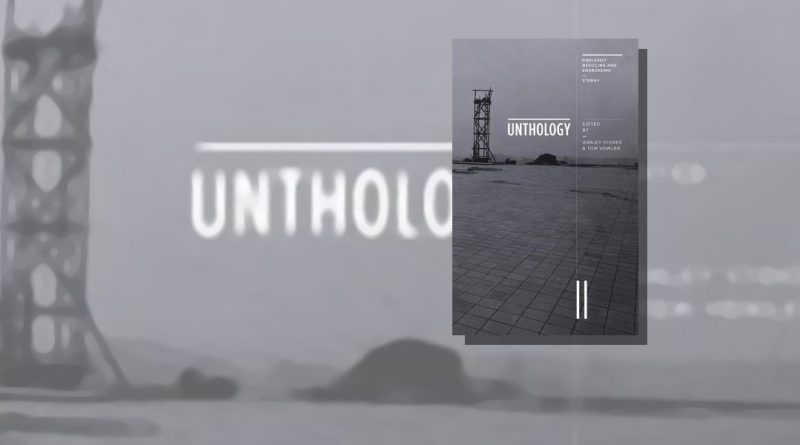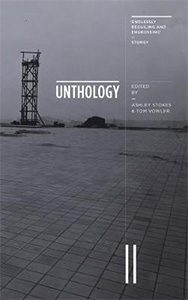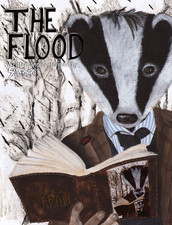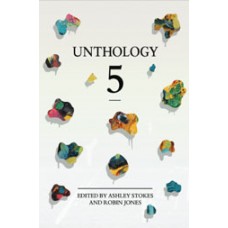Unthology 11 edited by Ashley Stokes & Tom Vowler
– Reviewed by Sam Edwards –
Unthology 11 is the latest anthology of experimental short stories to emerge from Unthank Books. Edited by long-time editor Ashley Stokes, and new arrival Tom Vowler, volume 11 is the culmination of work from seasoned authors and emerging writers alike. In welcoming us to “the hinterland” the editors set the tone of the stories to come, as they ask: “What would it take to push you to the edge? And beyond?”
In Davenport Randell’s ‘Bloodstock’, we are plunged into the darker side of human nature. A bleak tale, written in the second person, and set in an unnamed compound, “you” are a slave. When the people around you are dropping dead like flies, Randall poses, how do you survive? The skill in which Randell directs the eye from one facet of horror to another, is exceptional. The chronology of certain plot details and backstory, whether intentional or not, is sometimes lost within the chaos – but it works regardless. For when you are a prisoner of the dark, how certain can time – or moreover, your identity – be, when everything else is lost?
‘He has two sticks and twirls one of them in the air, making Dante flinch. “Shepherds would have sat here. Pretending to mind their flocks by night. But really they were the wisest of them all. Wiser than the Wise Men.”’
Georgina Parfitt’s ‘Wise Man’ is an ominous coming-of-age tale with a twist of pagan ritual.
Stylistically reminiscent of Katherine Mansfield, we follow Dante and his circle of friends as they celebrate Christmas Eve the way any group of sound-minded teenagers might – by posting “gifts” through the townsfolk’s letter-boxes. A strange and poignant narrative that elicits a sense of self-reflection, where I recalled my own not-so innocent ventures of times-gone-by. Parfitt’s skill resides in her ability to address those moments of awe you experience growing up – those moments that closely follow fright and wonder.
In rare places, the momentum of Unthology 11 falters due to the inclusion of a narrative that feels forced. Subtlety and pragmatism create the foundations for believable and engaging relationships, but when these aspects are absent, characters become empty stereotypes and the plot rings hollow. In Nick Holdstock’s ‘Half’, where a young woman reconnects with her heroin addicted step-brother, there are the ingredients, despite the cliché, for something exceptional. Holdstock struggles to demonstrate the layered relationship between his protagonist and her step-brother. Whilst his character’s backstories are genuinely interesting (Josh’s filming of birds), their interactions with each other are lacking, and attention frequently turns to the inconsequential meals they consume. As a result, Half unfortunately loses the intended gut-punch of its finale – which is a shame because I thought the ending was well-written, and appropriately keeps with the themes of the collection.
With ‘Peasant Number 4‘, Angela Readman has written a thought-provoking story that follows Meredith, a young woman who has started a new job at a museum village, roleplaying a medieval peasant. Her relationship with her husband is strained at best – but within her new job she finds a new lease for life. Readman rejuvenates the trope of the unhappy spouse, creating a believable, sympathetic character in Meredith. The existential exploration of time continues from Randell’s Bloodstock, but in a surprisingly original fashion. Rather than experiment, as Randell does, with the fracture of time that stems from trauma, Readman explores self-preservation through the adoption of a new space and time altogether.
In Jude Cook’s ‘The Night Nurse’, Chico, or Cheeky, is a homosexual Mexican nurse who works in a hospital in Highbury. For some reason, he explains, people do not naturally gravitate towards him –
‘Some people have a way of lighting up a room, of making strangers smile on first contact, whereas he’d never received such a reception in his life. If anything he feared he darkened every room he entered.’
But when the Nottage family arrive in the Nightingale Ward, Chico discovers a side to his personality he was previously unaware of. For a single story to encapsulate the themes of Unthology 11 so entirely, it goes without saying that Cook is talented. ‘The Night Nurse’ is smart, evocative and terrifyingly plausible.
In Chico, we see an ordinary man stretched to end of his tether, in an environment where lives are, quite literally, at the end of theirs. In pushing the boundaries between right and wrong to a sinister head, Cook eloquently illustrates why one must not look into the abyss: for at the bottom is an inexpressible charm that attracts us.
For the most part, Unthology 11 is a success. Its authors, with varying levels of confidence, have created believable, grey worlds in which their protagonists have arrived at a figurative crossroads – where, in that space and time, their next decision means everything. Sometimes intriguing, and often disturbing, these stories predominantly adhere to the spirit of “the hinterland”, and this has undoubtedly taken a good deal of time and effort to curate. Perhaps I would have liked to have seen a couple of the stories further developed – but Unthology 11 has left me sated, and excited for the next course.
Find out more about Unthology 11 on the Unthank Books website.

Reviewed by Sam Edwards — Sam graduated from the University of East Anglia with a degree in English Literature in 2018. After returning to his hometown Manchester, Sam worked in bars for a year, and it was around this time he started writing for Sabotage Reviews.
Nowadays he writes copy for a Health Care firm in London. In his spare time he reads and writes his own fiction, whilst keeping up his reviews for Sabotage.





